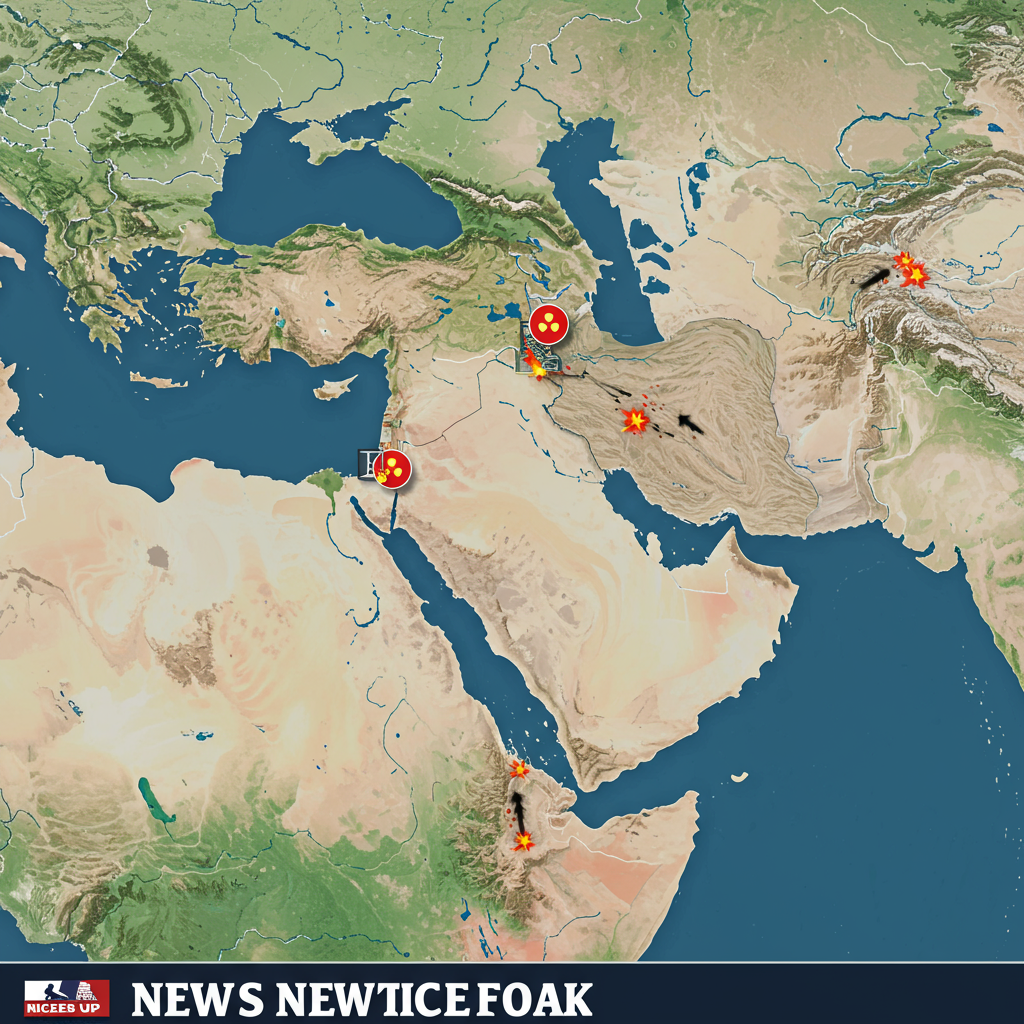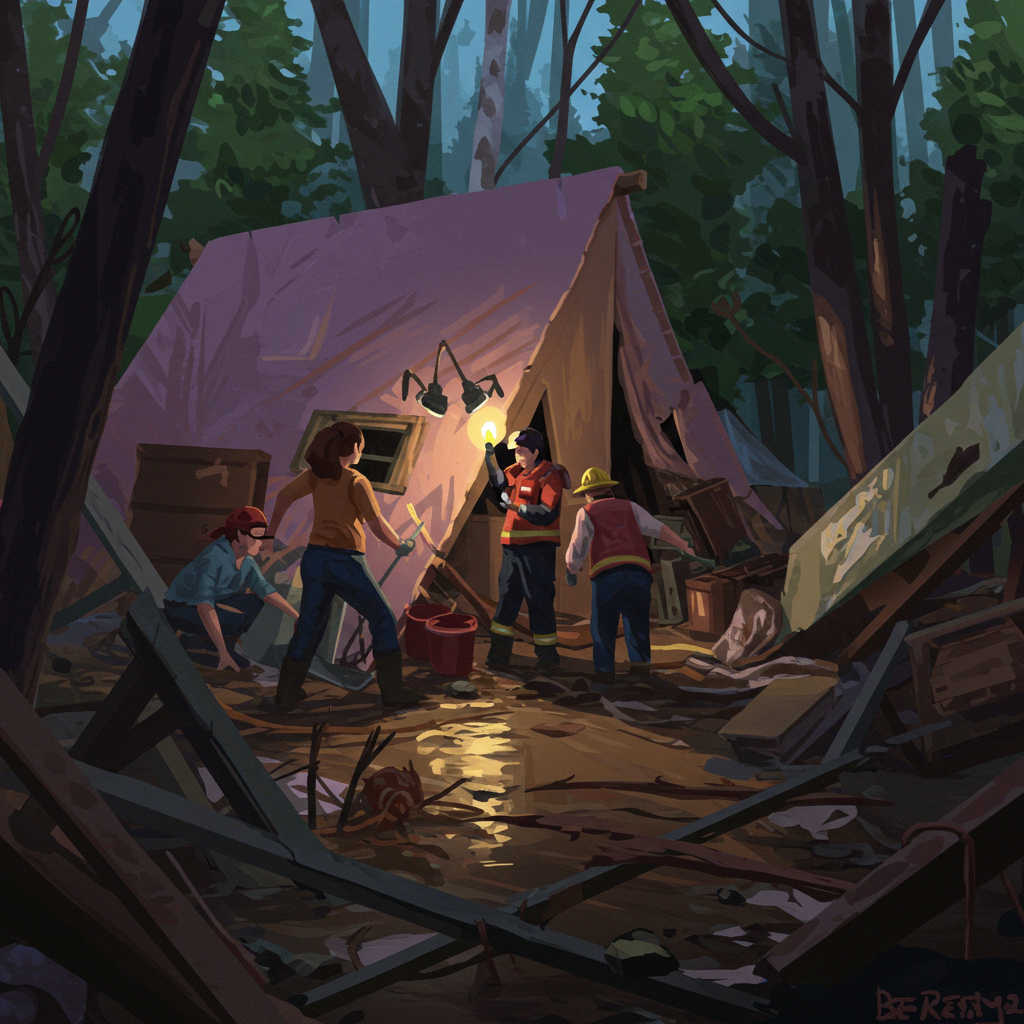Fears are running high across the Middle East and globally after the United States conducted significant military strikes targeting Iranian nuclear facilities over the weekend. As Iran weighs its options for retaliation, the region is bracing for a potential escalation of an already volatile conflict involving Israel.
The U.S. operation, dubbed “Operation Midnight Hammer,” saw American forces strike three Iranian nuclear sites – Fordow, Natanz, and Isfahan – on Sunday, June 22, 2025. The attack involved powerful assets, including B-2 Spirit stealth bombers deploying 30,000-pound Massive Ordnance Penetrators (MOPs), also known as “bunker busters,” designed to hit deeply buried targets, alongside submarine-launched Tomahawk cruise missiles.
President Trump declared the strikes “very successful,” claiming Iran’s nuclear program had been “totally obliterated.” However, assessments from military officials and international observers offer a more cautious view, describing the damage as “severe” but acknowledging uncertainty, particularly regarding the fate of Iran’s stockpile of near-bomb-grade uranium. The International Atomic Energy Agency (IAEA), the UN nuclear watchdog, held an emergency meeting amid concerns, stressing that nuclear facilities should not be targeted. IAEA officials later reported seeing craters at the Fordow site but could not confirm the extent of underground damage or the whereabouts of highly enriched uranium, which some intelligence suggests may have been moved by Iran before the strike.
Iran Considers Retaliation Amid Heightened Alert
Following the U.S. strikes, Iran has signaled defiance and the intent to retaliate. Foreign Minister Abbas Araghchi was expected to meet with Russian President Vladimir Putin, a key ally, as Tehran appeared to be considering various responses. While Russia has offered mediation and condemned the U.S. action, the extent of military support Moscow might provide remains uncertain.
Iranian officials have stated they will not return to diplomacy until they have retaliated against the U.S. for siding with Israel. Commander Amir Hatami vowed a “decisive response” to the United States, while Supreme Leader Ayatollah Ali Khamenei declared that perceived fear encourages enemies and maintained that Iran’s “punishment continues” against Israel. A spokesperson for Iran’s Khatam al-Anbiya Central Headquarters warned of heavy consequences for the U.S., stating Iran would “be the ones to end it” if the U.S. started a war.
One significant potential response being debated in Iran is the closure of the Strait of Hormuz, a crucial choke point for global oil and gas shipments. While Iran’s parliament reportedly backed the measure, the final decision rests with the Supreme National Security Council, and Foreign Minister Araghchi remained ambiguous on the issue. U.S. Secretary of State Marco Rubio called the potential move “suicidal,” urging China, a major importer of Iranian oil, to help dissuade Tehran. Analysts note that closing the strait would cause severe economic damage to Iran itself, as nearly all its oil exports pass through the waterway, which handles about a quarter of the world’s oil and 20% of its liquefied natural gas.
The U.S. is on high alert, with warnings issued to citizens abroad and security increased domestically. American military and intelligence detected signs that Iran-backed militias were preparing possible attacks on U.S. bases in Iraq and Syria. The Pentagon is repositioning military assets, including fighter jets and potentially a second aircraft carrier group, in the region as a precaution.
Israel-Iran Exchanges Intensify
The U.S. intervention occurred amidst an ongoing conflict between Israel and Iran, which had seen exchanges of fire in the preceding week, beginning with an Israeli attack on June 13. This conflict escalated further alongside the U.S. strikes.
On Monday, June 23, Israel and Iran traded fresh fire. Israeli forces reported launching further attacks on “military targets” in Tehran, including sites associated with the Revolutionary Guards, government buildings, and even reportedly the gate of Evin Prison. Reports also indicated Israeli strikes targeting nuclear facilities, missile launchers, and air defense sites in various Iranian provinces, including Kermanshah, Karaj, and Yazd. One notable claim from Israel was the killing of Maj. Gen. Ali Shamdani, identified as Iran’s wartime chief of staff.
Meanwhile, Israelis took shelter amid barrages of Iranian missiles and drones launched towards the country. While Israeli air defenses like Iron Dome intercepted many projectiles, some reportedly impacted civilian areas and infrastructure, including a medical center. Casualty reports varied, with Israel reporting hundreds of hospitalizations mostly from minor injuries or anxiety, and human rights groups citing significantly higher numbers of injuries and deaths in Iran from Israeli strikes.
Global Repercussions and International Reactions
The widening conflict has triggered significant international concern and diverse reactions:
Economic Impact: Asian and European markets dipped, reflecting investor concern over the potential fallout, particularly fears of disruption to oil supplies through the Strait of Hormuz. Oil prices spiked, reaching a five-month high, although analysts noted market volatility would depend on whether the conflict escalates further. Strikes on Iranian energy infrastructure, such as the South Pars gas field and Shahran oil depot, also contributed to price increases.
Diplomacy Calls: EU foreign ministers discussed the situation, with the bloc’s chief diplomat emphasizing the focus on a diplomatic solution and the “huge” concerns of escalation. The UN Secretary General expressed grave alarm, warning of catastrophic consequences if the conflict spiraled out of control. The head of the IAEA urged all parties to find a pathway to diplomacy to prevent unimaginable levels of violence and destruction. Pope Leo XIV called for peace and diplomacy.
Condemnation & Support: Russia and China strongly condemned the U.S. strikes as a violation of international law, calling for de-escalation and a ceasefire (particularly by Israel). China’s UN ambassador criticized the U.S.’s credibility. North Korea also condemned the U.S., blaming Washington for the escalation. Conversely, Israel hailed the U.S. action, with Prime Minister Netanyahu welcoming the “bold decision” and even suggesting regime change could result, a point contradicted by official U.S. statements but floated publicly by President Trump. Australia supported the U.S. strike’s aim of preventing Iran from acquiring nuclear weapons but urged a return to dialogue. Germany’s Chancellor reportedly stated Israel was doing the “dirty work” for the world.
Travel Disruption: The escalating conflict has impacted international travel, with airlines suspending flights over the region and thousands of tourists reportedly stranded in Israel due to airspace closures. The U.S. State Department issued a worldwide caution alert and updated its travel advisory for Israel to Level 4: Do Not Travel.
Nuclear Program Status Uncertain
Despite President Trump’s claim of “obliteration,” the actual state of Iran’s nuclear program remains murky. While U.S. military officials described “severe damage” to the targeted sites – Fordo, Natanz, and Isfahan – they also conceded they did not know the whereabouts of Iran’s stockpile of near-bomb-grade uranium, enough for potentially nine or ten weapons. This uranium was last seen by IAEA inspectors about a week before the Israeli attacks began.
Experts estimate the strikes could set back Iran’s nuclear weapon program by two to five years. However, Iran is reportedly building a new, deep replacement facility for Natanz, and history shows Iran has rebuilt and installed more sophisticated equipment following past attacks and sabotage. The suspension of international inspections by Iran during the conflict further complicates efforts to verify the program’s status and the location of the enriched uranium.
Concerns Mount at Home and Abroad
The U.S. strikes have also sparked debate domestically. Some lawmakers questioned President Trump’s authority under the War Powers Act, with measures filed in Congress seeking to require legislative authorization for military action against Iran. Concerns also mounted among families of U.S. service members, particularly those stationed in the Middle East, who face the potential repercussions of escalating conflict.
As civilians, diplomats, and military officials across continents anxiously await Iran’s response, the core questions remain: How will Iran retaliate, what will be the impact on the global economy, and can further, potentially catastrophic, escalation be avoided? The coming days are likely to be critical in determining the trajectory of this dangerous new phase in the Middle East conflict.



